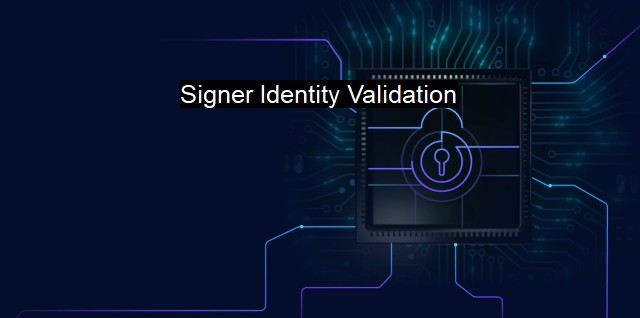What is Signer Identity Validation?
Signer Identity Validation (SIDV): A Crucial Tool in Ensuring Secure Digital Signatures and Protecting Against Cybercrime
Signer Identity Validation is a crucial concept in cybersecurity and antivirus. Signer Identity Validation is a process that tests and confirms the legitimacy of the entity or person who has signed a certain document, piece of data or software code.Before delving into the core concept, it's beneficial to comprehend the broader context. Cybersecurity has become a necessity in the modern age, wherein the rise of malicious software threats jeopardizes information security. As a consequence, the robust nature of antivirus software comes into play, serving as sturdy lines of defense against cybersecurity threats. Antivirus software focuses mainly on detecting, preventing, and removing malware. before the antivirus software itself can be trusted, it needs validation - which brings us to the essential role of Signer Identity Validation.
Signer Identity Validation works on all forms of data that a software programmer or entity signs digitally. It's an important procedure for the antivirus software to ascertain if this piece of software is reliable or it is just another form of malicious code designed to exploit the system.
Signer Identity Validation is essentially built around the concept of digital signatures. Similar to how a manual signature authenticates the legitimacy of a document, a digital signature supports the claim that a software or data originated from a trusted source. When someone signs a piece of software, a digital signature is meticulously generated, offering assurances on the genuineness of the software's origin.
The process of Signer Identity Validation begins when the system receives a piece of software or data. This digital content has an attached signature with it, unique to the signer's identity. The system then utilizes advanced algorithms and complex mathematical protocols to confirm the signature's integrity. If the system finds a match between the signature provided and the source’s recognized signature in its database, it validates the signer's identity.
Signer Identity Validation becomes more remarkable when you consider its implications for antivirus software. No security system would be completely effective without an assurance mechanism to check that the software or data it confronts comes from a trusted source. Imagine an antivirus software that simply allows any program to run without cross-verifying its origin. It would potentiate a significant risk of the solicited system harboring malicious code.
By comparison, an antivirus system furnished with Signer Identity Validation reduces the probability of such a catastrophe, implementing checks on code integrity made possible by identity verification. Given that typical cyber threats like viruses, spyware, and worms are coded and signed by unknown entities, antivirus programs deeply wired with Signer Identity Validation would automatically treat such code as threats and, therefore, respond appropriately.
Just as it's the masterpiece of cybersecurity frameworks, Signer Identity Validation isn't entirely without flaws. The process could be vulnerable if a cyber-criminal obtains a genuine signature maliciously or if a legitimate entity unintentionally sows a piece of rogue software into the system, believing it's a safe application.
Despite these restrictions, Signer Identity Validation is, undeniably, a critical part of cybersecurity architecture. It acts as a guard post to ensure that only signed and verified applications or data have access into the system. Knowing that this sophisticated backdrop shields the cyberspace, we can feel somewhat safer about our data and privacy. It's also one of the primary reasons why cyber professionals suggest always downloading software from pleasantly endorsed platforms that follow a rigorous Signer Identity Validation process.
In the final analysis, recognizing and implementing Signer Identity Validation benefits both the antivirus software developers and users. The software developers can be confident about the integrity of their software, and users can feel secure that their digital environment is shielded from damaging malware.

Signer Identity Validation FAQs
What is signer identity validation?
Signer identity validation is a crucial security process in cybersecurity that verifies the identity of the individual or organization who signed a specific software application, code or file. It is used to ensure that the signing entity is legitimate, and the code has not been tampered with.Why is signer identity validation important?
Signer identity validation is important as it helps in preventing malicious software or files from being installed on your system. If the signing entity is not verified, then it could be an imposter trying to spoof their identity to gain access to your system or data.What are the methods used for signer identity validation?
The common methods used for signer identity validation include checking digital certificates, verifying the cryptographic hash of the file, and authenticating the signing entity through trusted third-party authorities. These methods ensure that the code or file is signed by a verified entity and has not been modified or tampered with.What are the risks of not validating signer identity?
If signer identity is not validated, it can lead to various security risks, including the installation of malware or spyware on your system. These threats can steal sensitive data, install ransomware, or cause system damage. Therefore, it is essential to have proper signer identity validation processes in place to prevent these security threats.| | A | | | B | | | C | | | D | | | E | | | F | | | G | | | H | | | I | | | J | | | K | | | L | | | M | |
| | N | | | O | | | P | | | Q | | | R | | | S | | | T | | | U | | | V | | | W | | | X | | | Y | | | Z | |
| | 1 | | | 2 | | | 3 | | | 4 | | | 7 | | | 8 | | |||||||